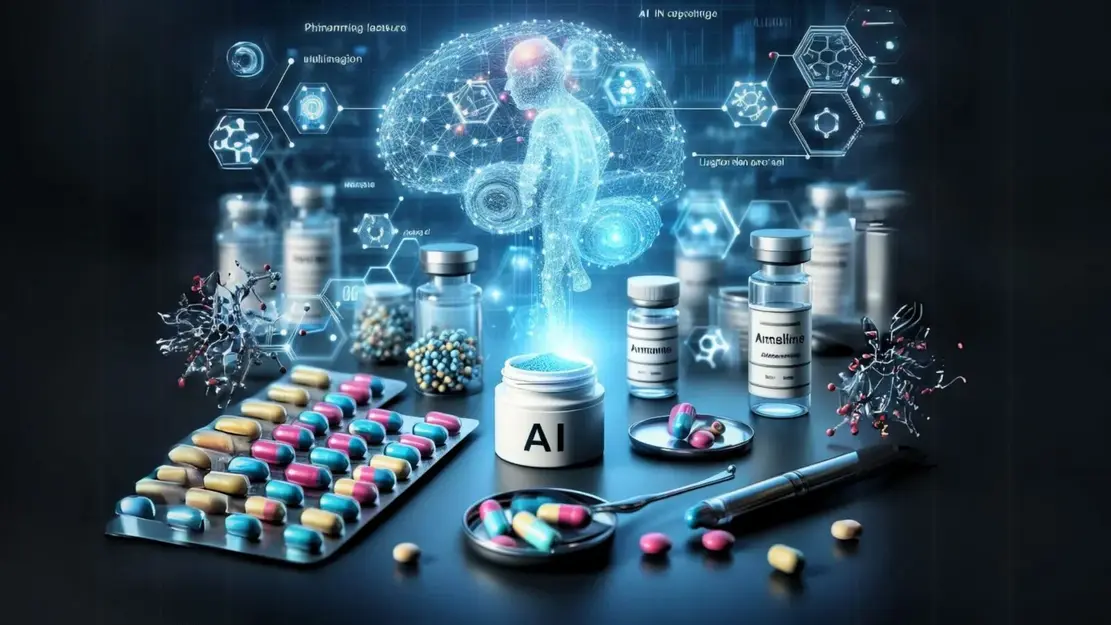
The combination of genetics and artificial intelligence (AI) is transforming the future of healthcare, research, and personalized medicine. Genomics, which studies all the genes in an organism, has always required vast amounts of data and advanced computing technology to extract useful information. AI is making genetic discovery faster, more accurate, and more comprehensive than ever before. AI-driven genomic tools can analyze vast amounts of sequence data, uncover subtle genetic changes, and better predict who is at risk of developing diseases.
This combination is transforming not only medical research but also patient care, drug development, and disease prevention. AI in genomics is changing the way the world thinks about healthcare, enabling earlier disease diagnosis, personalized treatment plans, and new medical discoveries. AI is a pillar of precision medicine, helping us make discoveries faster and develop better therapies as we move further into this new era. This article explores how AI in genomics is transforming genomic medicine, its opportunities, challenges, and future developments.
Applications of AI in Genomic Data Analysis:
Genome sequencing generates enormous datasets that are often too complex for standard computer models. Artificial intelligence, particularly machine learning and deep learning, offers powerful tools to process these massive datasets in ways unmatched by other technologies. Algorithms can discover patterns, categorize genetic differences, and predict how mutations affect the functioning of things in ways that humans cannot manually. Using AI models, researchers can now examine entire genomes in hours instead of weeks. These advancements not only accelerate scientific discovery but also increase accuracy by reducing the risk of human error. AI is also crucial for identifying unusual genetic abnormalities associated with diseases. This helps doctors detect and better understand conditions such as cancer, rare genetic disorders, and inherited heart diseases earlier.
AI in Personalized Treatment and Precision Medicine:
One of the most important ways in which AI is transforming genomics is in precision medicine. AI enables doctors and nurses to tailor medications to each individual’s genetic makeup, which is unique to each individual. AI can improve success rates by integrating patient data (including genome sequence, clinical history, and environmental factors) to recommend personalized treatments. AI is already being applied in oncology to match cancer patients with targeted medications that better match their specific mutations. This is an example of personalized treatment. AI algorithms can, for example, predict how a tumor will respond to a particular therapy. This ensures that patients receive the best treatment and minimize side effects. This shift from a one-size-fits-all approach to precision medicine has the potential to transform the way we treat diseases worldwide.
Using AI and Genomics to Accelerate Drug Discovery:
Traditional approaches to developing new drugs are time-consuming, costly, and often lack clear objectives. But the combination of AI and genomics transforms this process, allowing researchers to identify new therapeutic targets more easily and quickly. AI can use genomic data to identify genetic markers associated with a disease. This helps researchers identify potentially effective drug regimens. AI models can also simulate how drugs interact with specific genes or mutations, significantly reducing the trial-and-error approach long used in drug research. A growing number of pharmaceutical companies are using AI-driven genomic technologies to reduce costs, accelerate research, and improve success rates. This potentially allows patients to receive new treatments sooner that target the genetic origins of a disease, rather than just the symptoms.
AI-Powered Advances in Genetic Diagnostics:
Genetic testing has long been an essential part of modern medicine, but AI is further enhancing it. Traditional diagnostic techniques often miss subtle genetic changes that can influence disease progression. AI-driven genomic analysis can more accurately detect these subtle markers, leading to more precise diagnoses. AI algorithms are now being used to predict who is more likely to develop Alzheimer’s disease, diabetes, and other rare genetic disorders. Using AI for genomic sequencing in prenatal care can detect genetic problems early, empowering parents and doctors to make better choices. By combining genomic sequencing with artificial intelligence (AI), tests not only become faster and more accurate, but also more affordable. This makes them accessible to more people.
Ethical and Privacy Issues in AI-Driven Genomics:
Artificial intelligence offers enormous potential in genomics, but also raises significant ethical and privacy issues. Protecting genomic data is crucial because it is highly private. AI systems require vast amounts of data, often requiring data sharing between countries and institutions. This increases the risk of data theft or misuse. Furthermore, there are issues related to informed consent, ownership of genetic information, and the question of whether people will be discriminated against based on their genetic predisposition.
To ensure the responsible use of AI applications in genomics, robust regulatory and ethical frameworks are necessary. Healthcare providers, policymakers, and AI developers must work together to establish a system that respects people’s privacy while simultaneously promoting scientific progress. One of the greatest challenges for AI-driven genomics in the future is how to balance innovation with ethical responsibility.
The Future of AI in Genomic Medicine:
The future of AI in genomics is promising, with rapid technological and medical applications expected. As sequencing costs decrease and AI algorithms continue to improve, genomics will become an integral part of everyday healthcare. AI can not only improve diagnosis and treatment but also enhance preventive care by predicting disease risk before symptoms appear.
The collaborative efforts of global biotech companies, healthcare institutions, and AI companies can accelerate the pace of discovery and make gene therapy accessible to millions of people worldwide. The ultimate goal is a healthcare system where AI continuously explores and analyzes our genetic data, providing personalized health information and recommendations in real time. Thanks to AI, the dream of personalized medicine is rapidly becoming a reality.
Conclusion:
The combination of AI and genomics is dramatically changing how we view healthcare, disease prevention, and medical research. Thanks to the power of machine learning and powerful algorithms, researchers and healthcare providers can now decode the human genome with unprecedented precision. This revolution accelerates scientific discovery and helps patients by providing personalized treatments, speeding up drug development, and improving diagnostic accuracy.
While there are ethical and privacy concerns that require careful consideration, AI holds enormous long-term promise for genomics. We are entering a new era of medicine that can leverage an individual’s unique genetic makeup to predict, prevent, and treat diseases. As AI continues to develop, it will lay the foundation for a healthier, more personalized future.
FAQs:
1. What role does AI play in genomics?
Genomic AI helps to quickly and accurately analyze large amounts of genetic data, identify mutations, predict disease risk, and support precision medicine.
2. How does AI fit into precision medicine?
AI combines genomic data with a patient’s medical history to provide personalized treatment plans for each individual. This ensures that medications work better and are better tailored to each individual’s genetic makeup.
3. Can AI accelerate the development of new genomic medicines?
Yes, AI can identify potential therapeutic targets based on genomic data, simulate drug interactions, and accelerate the development of new therapies.
4. What ethical issues does AI genomics face?
Key issues include data privacy, ownership of genetic information, informed consent, and the potential for genetic discrimination.
5. What role will AI play in genomics in the future?
In the future, AI-driven genomic technologies will be widely applied in healthcare. This will enable predictive medicine, faster diagnoses, and personalized medicine for patients worldwide.



